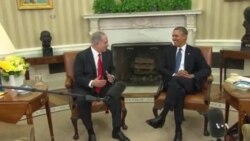STATE DEPARTMENT —
President Obama is more directly pushing Israeli and Palestinian leaders toward a framework for peace talks, calling for compromise by all sides. But there is little progress in the U.S.-led negotiations on a two-state solution because of differences over Israeli settlements and security.
Obama says it is time for some tough decisions over "profound" issues in the Middle East.
"It is my belief that ultimately it is still possible to create two states - a Jewish state of Israel and a state of Palestine in which people are living side by side in peace and security. But it is difficult and it requires compromise on all sides," he said.
With less than two months left in U.S.-led negotiations, Obama is weighing-in more directly with both sides on an issue he has come to late in his presidency and with limited influence, says former U.S. ambassador Adam Ereli.
"The relationship between Netanyahu and Obama is so bad it is hard to see the U.S. having the influence with the Israelis that we need," he said.
Chief among the obstacles are Israeli security concerns. U.S. officials say they are working to satisfy those concerns with "the best ideas in the Pentagon and the best technology."
Prime Minister Benjamin Netanyahu is not convinced.
"The best way to guarantee peace is to be strong. And that is what the people of Israel expect me to do - to stand strong against criticism, against pressure, stand strong to secure the future of the one and only Jewish state," he said.
U.S. Secretary of State John Kerry says a secure future means working with Palestinians who understand "the tremendous benefits of peace and the great costs of failure."
"President Abbas has been genuinely committed against violence," he said. "And his own security forces have worked closely with Israel in order to prevent violence against Israeli citizens."
It is a familiar problem for Washington, says American University professor Hillary Mann Leverett.
"As former Secretary of State Kissinger used to say, 'You know, the Israelis are either so strong they do not feel any urgency or they are so weak they are too scared to make concessions.' So this is a problem, a dilemma that we have had for decades," she said.
At best these talks would result in a framework for direct negotiations on the status of Jerusalem and new Israeli settlements in the occupied West Bank, both issues which grow more difficult with time.
"For both Palestinians and Israelis the longer there is not a settlement, the longer people are in Gaza, in the camps, in the West Bank, the longer those people are without a country without a state without a future without hope, the greater the chance for violence," said former U.S. ambassador Adam Ereli.
President Obama follows up with a White House meeting later this month with President Abbas as Prime Minister Netanyahu calls on Palestinians to join an accord that he says could "catapult the region forward" on energy and education.
Obama says it is time for some tough decisions over "profound" issues in the Middle East.
"It is my belief that ultimately it is still possible to create two states - a Jewish state of Israel and a state of Palestine in which people are living side by side in peace and security. But it is difficult and it requires compromise on all sides," he said.
With less than two months left in U.S.-led negotiations, Obama is weighing-in more directly with both sides on an issue he has come to late in his presidency and with limited influence, says former U.S. ambassador Adam Ereli.
"The relationship between Netanyahu and Obama is so bad it is hard to see the U.S. having the influence with the Israelis that we need," he said.
Chief among the obstacles are Israeli security concerns. U.S. officials say they are working to satisfy those concerns with "the best ideas in the Pentagon and the best technology."
Prime Minister Benjamin Netanyahu is not convinced.
"The best way to guarantee peace is to be strong. And that is what the people of Israel expect me to do - to stand strong against criticism, against pressure, stand strong to secure the future of the one and only Jewish state," he said.
U.S. Secretary of State John Kerry says a secure future means working with Palestinians who understand "the tremendous benefits of peace and the great costs of failure."
"President Abbas has been genuinely committed against violence," he said. "And his own security forces have worked closely with Israel in order to prevent violence against Israeli citizens."
It is a familiar problem for Washington, says American University professor Hillary Mann Leverett.
"As former Secretary of State Kissinger used to say, 'You know, the Israelis are either so strong they do not feel any urgency or they are so weak they are too scared to make concessions.' So this is a problem, a dilemma that we have had for decades," she said.
At best these talks would result in a framework for direct negotiations on the status of Jerusalem and new Israeli settlements in the occupied West Bank, both issues which grow more difficult with time.
"For both Palestinians and Israelis the longer there is not a settlement, the longer people are in Gaza, in the camps, in the West Bank, the longer those people are without a country without a state without a future without hope, the greater the chance for violence," said former U.S. ambassador Adam Ereli.
President Obama follows up with a White House meeting later this month with President Abbas as Prime Minister Netanyahu calls on Palestinians to join an accord that he says could "catapult the region forward" on energy and education.





